Abstract
BACKGROUND. Despite public health efforts, the prevalence of smoking among African Americans remains high. The determinants of smoking behavior in this population must be elucidated so that interventions can be better targeted and more effective. METHODS. As part of a prospective community intervention trial to reduce cancer mortality, we conducted a random household survey of 1137 African-American adults in San Francisco and Oakland between November 1985 and July 1986. The survey instrument included questions about social network characteristics, instrumental and emotional aspects of social support, smoking behavior, and stressors. RESULTS. The overall prevalence of smoking (41.9%) was higher than that reported in national surveys. Logistic models revealed that persons reporting high levels of stress, represented by an abbreviated hassles index, were more likely to smoke than those reporting less stress. Women with poor social networks were more likely to smoke (odds ratio = 3.1) than women with optimal networks; however, this relationship did not hold among men. Indeed, men lacking emotional support from friends or family were less likely to smoke (odds ratio = 0.5) than men receiving such support. No interaction between social support and hassles was observed. CONCLUSIONS. Stressful environments may contribute to high-risk smoking behavior among urban African Americans.
Full text
PDF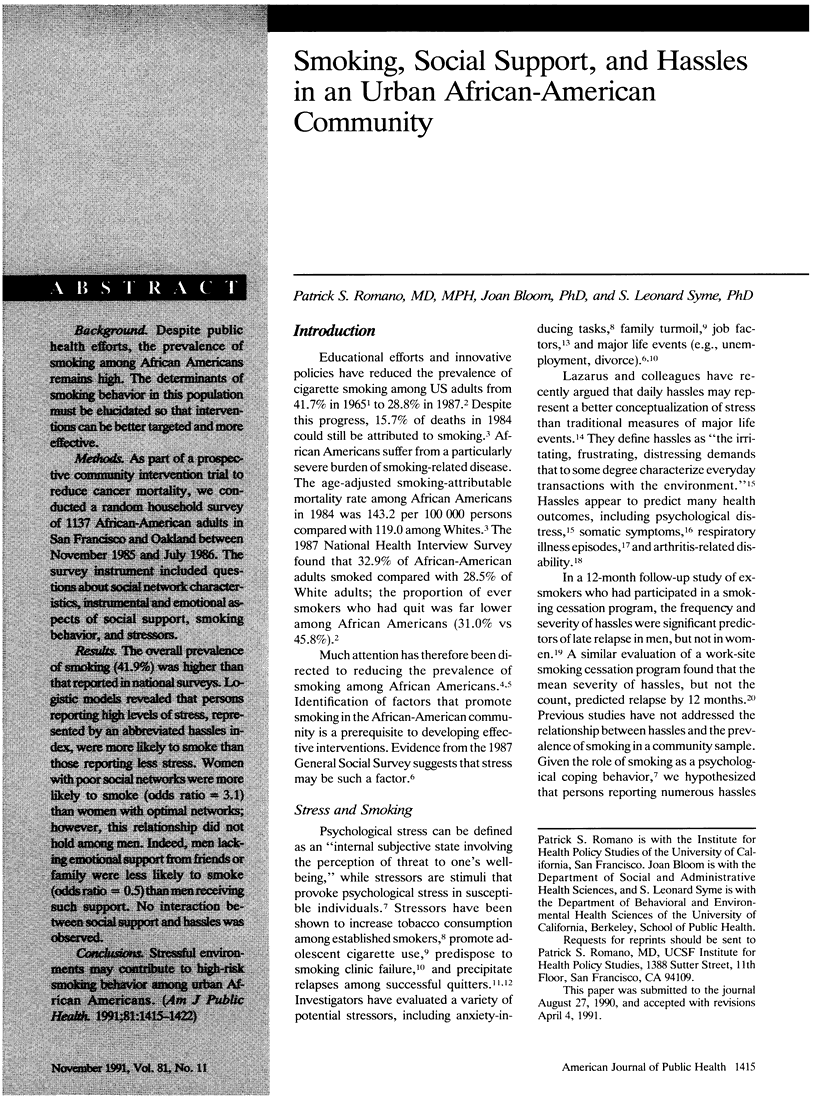
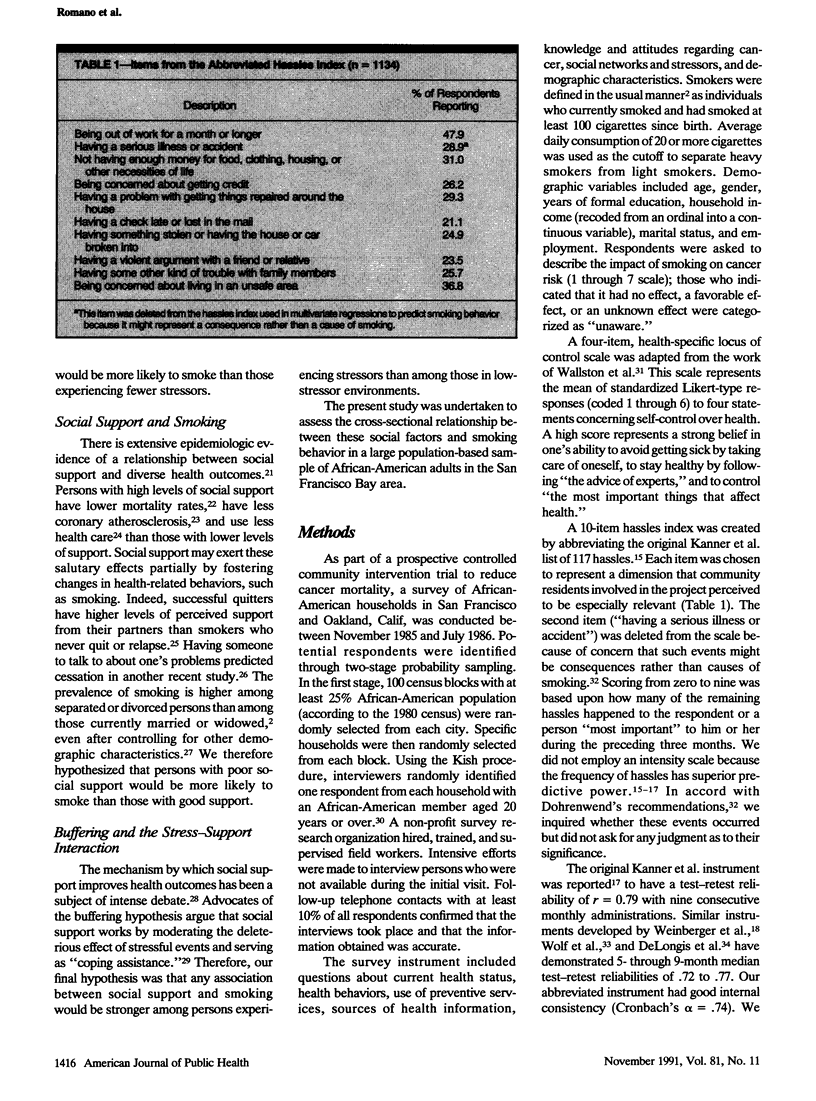
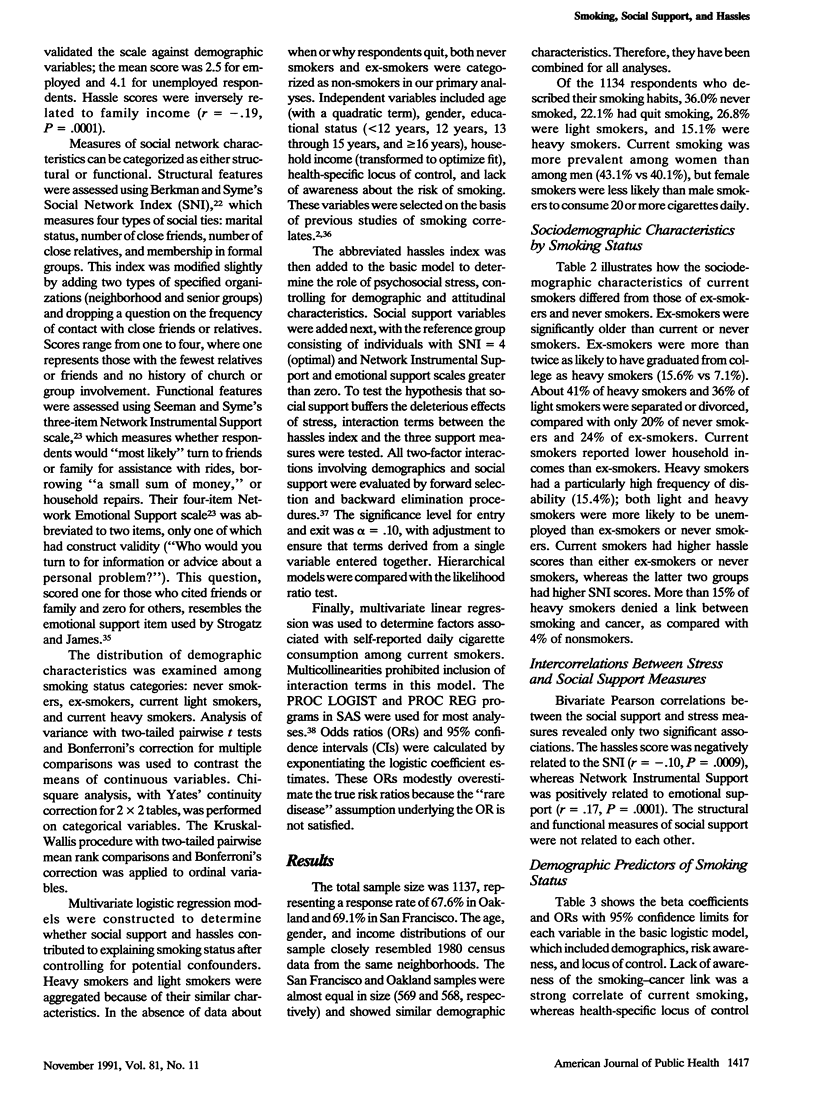
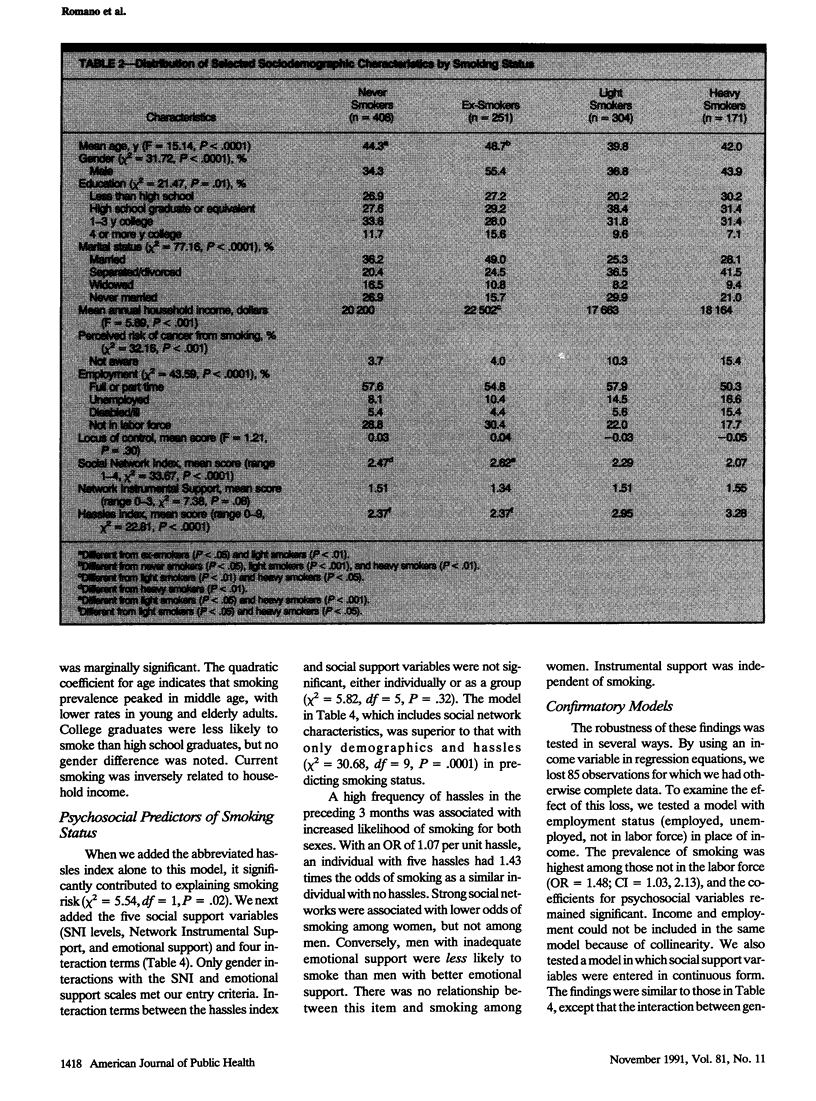
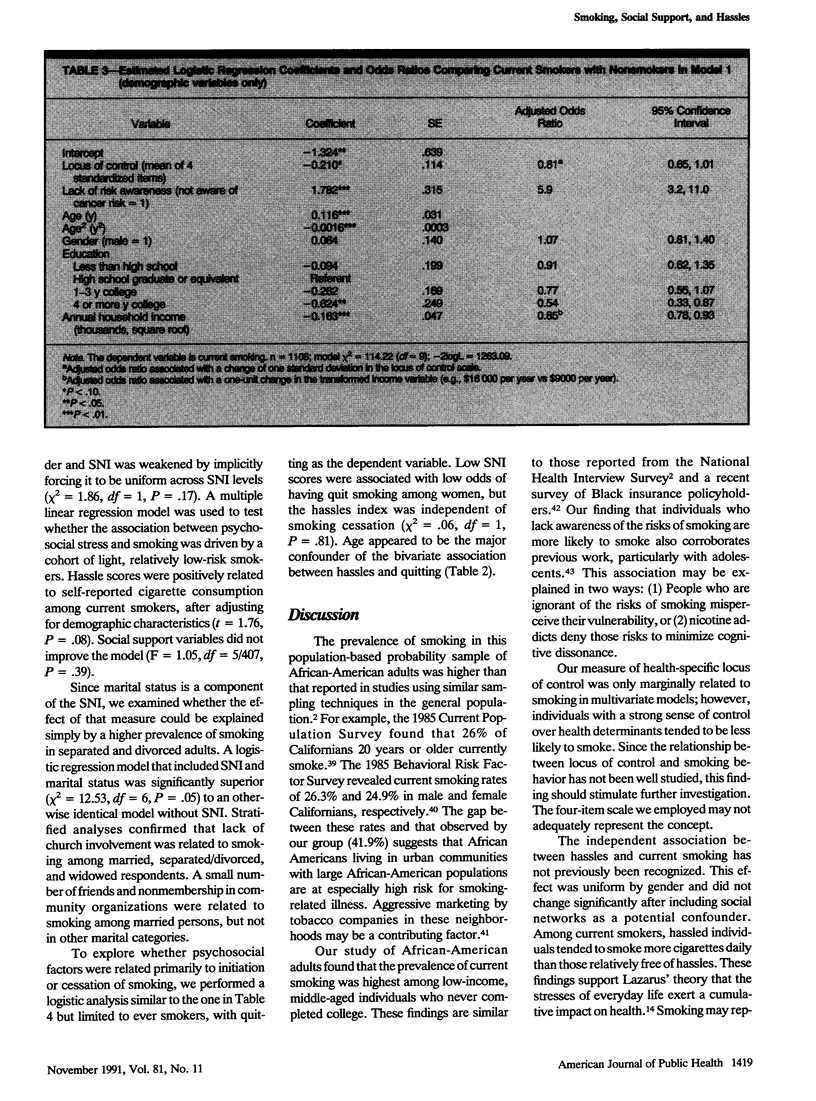
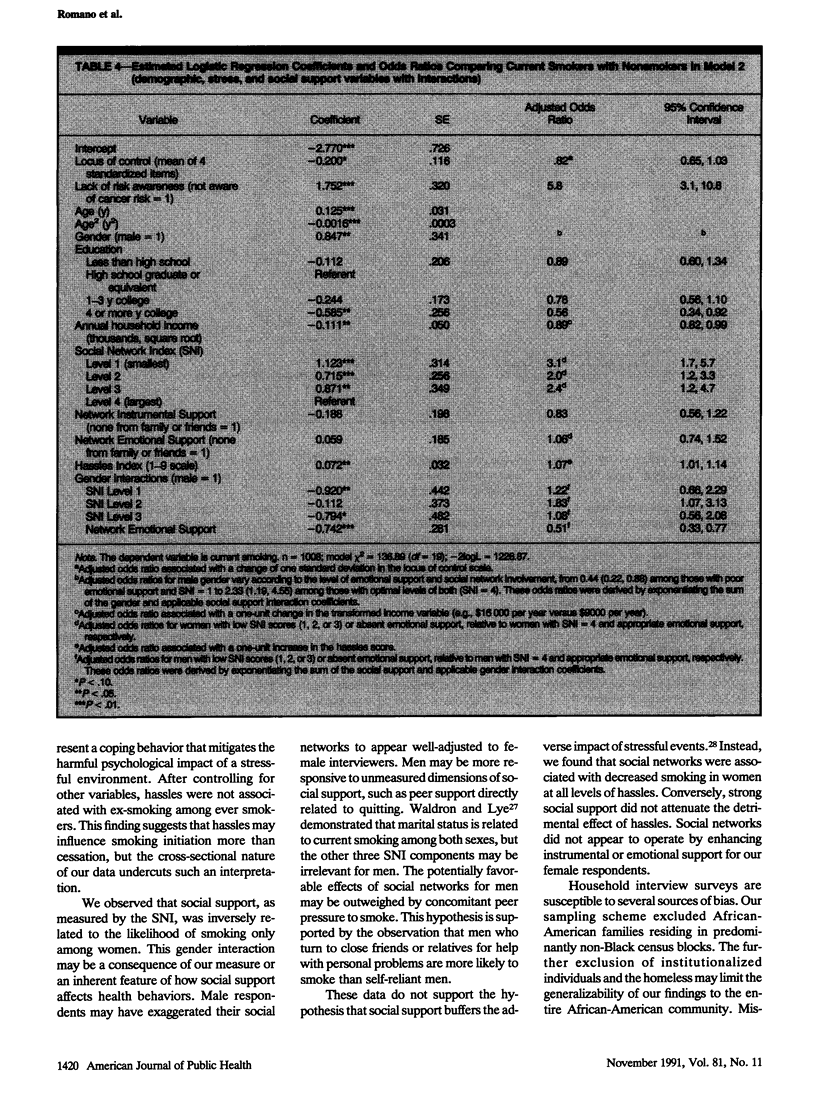
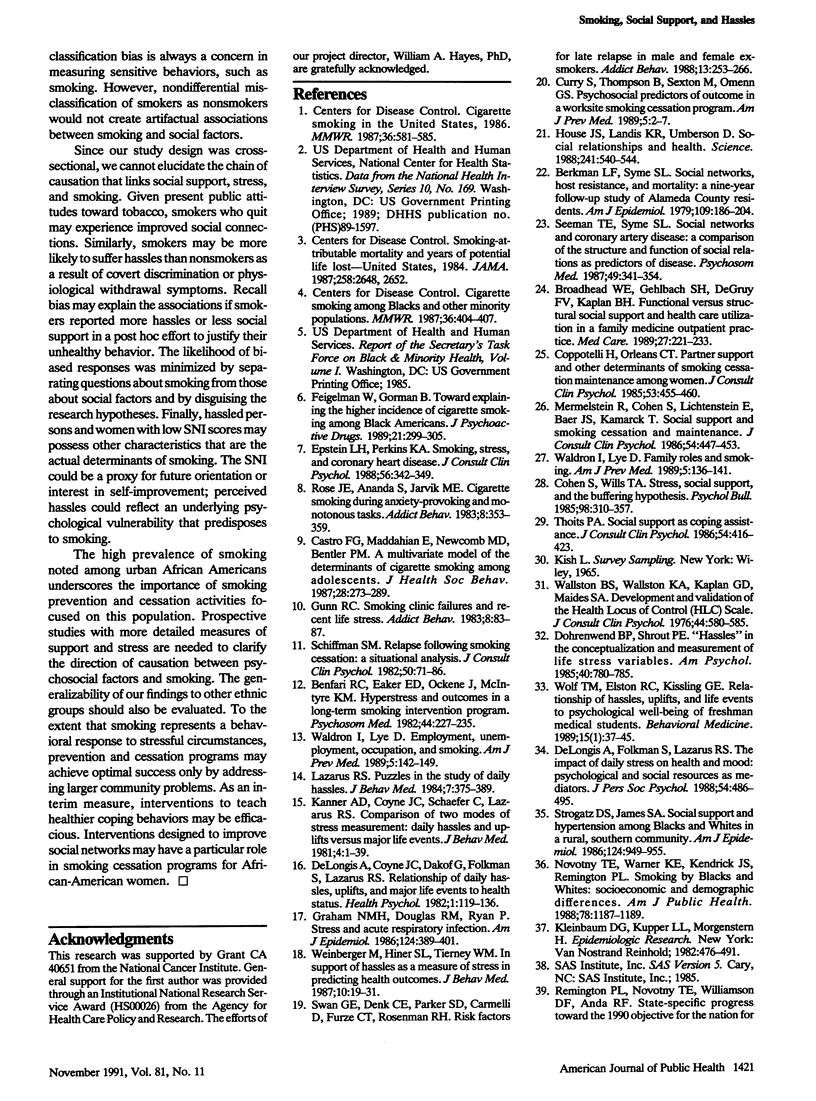
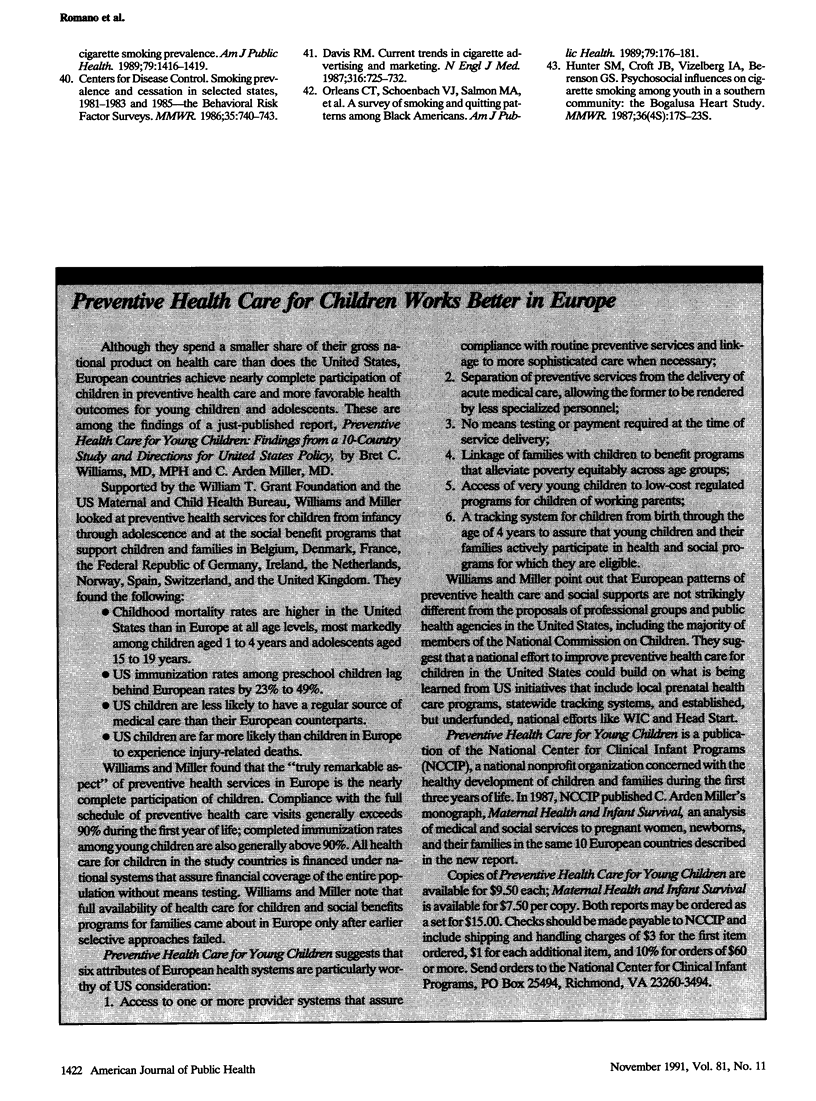
Selected References
These references are in PubMed. This may not be the complete list of references from this article.
- Benfari R. C., Eaker E. D., Ockene J., McIntyre K. M. Hyperstress and outcomes in a long-term smoking intervention program. Psychosom Med. 1982 Jul;44(3):227–235. doi: 10.1097/00006842-198207000-00001. [DOI] [PubMed] [Google Scholar]
- Berkman L. F., Syme S. L. Social networks, host resistance, and mortality: a nine-year follow-up study of Alameda County residents. Am J Epidemiol. 1979 Feb;109(2):186–204. doi: 10.1093/oxfordjournals.aje.a112674. [DOI] [PubMed] [Google Scholar]
- Broadhead W. E., Gehlbach S. H., deGruy F. V., Kaplan B. H. Functional versus structural social support and health care utilization in a family medicine outpatient practice. Med Care. 1989 Mar;27(3):221–233. doi: 10.1097/00005650-198903000-00001. [DOI] [PubMed] [Google Scholar]
- Castro F. G., Maddahian E., Newcomb M. D., Bentler P. M. A multivariate model of the determinants of cigarette smoking among adolescents. J Health Soc Behav. 1987 Sep;28(3):273–289. [PubMed] [Google Scholar]
- Cohen S., Wills T. A. Stress, social support, and the buffering hypothesis. Psychol Bull. 1985 Sep;98(2):310–357. [PubMed] [Google Scholar]
- Coppotelli H. C., Orleans C. T. Partner support and other determinants of smoking cessation maintenance among women. J Consult Clin Psychol. 1985 Aug;53(4):455–460. doi: 10.1037//0022-006x.53.4.455. [DOI] [PubMed] [Google Scholar]
- Curry S., Thompson B., Sexton M., Omenn G. S. Psychosocial predictors of outcome in a worksite smoking cessation program. Am J Prev Med. 1989 Jan-Feb;5(1):2–7. [PubMed] [Google Scholar]
- Davis R. M. Current trends in cigarette advertising and marketing. N Engl J Med. 1987 Mar 19;316(12):725–732. doi: 10.1056/NEJM198703193161206. [DOI] [PubMed] [Google Scholar]
- DeLongis A., Folkman S., Lazarus R. S. The impact of daily stress on health and mood: psychological and social resources as mediators. J Pers Soc Psychol. 1988 Mar;54(3):486–495. doi: 10.1037//0022-3514.54.3.486. [DOI] [PubMed] [Google Scholar]
- Epstein L. H., Perkins K. A. Smoking, stress, and coronary heart disease. J Consult Clin Psychol. 1988 Jun;56(3):342–349. doi: 10.1037//0022-006x.56.3.342. [DOI] [PubMed] [Google Scholar]
- Feigelman W., Gorman B. Toward explaining the higher incidence of cigarette smoking among black Americans. J Psychoactive Drugs. 1989 Jul-Sep;21(3):299–305. doi: 10.1080/02791072.1989.10472171. [DOI] [PubMed] [Google Scholar]
- Graham N. M., Douglas R. M., Ryan P. Stress and acute respiratory infection. Am J Epidemiol. 1986 Sep;124(3):389–401. doi: 10.1093/oxfordjournals.aje.a114409. [DOI] [PubMed] [Google Scholar]
- Gunn R. C. Smoking clinic failures and recent life stress. Addict Behav. 1983;8(1):83–87. doi: 10.1016/0306-4603(83)90062-x. [DOI] [PubMed] [Google Scholar]
- House J. S., Landis K. R., Umberson D. Social relationships and health. Science. 1988 Jul 29;241(4865):540–545. doi: 10.1126/science.3399889. [DOI] [PubMed] [Google Scholar]
- Hunter S. M., Croft J. B., Vizelberg I. A., Berenson G. S., Centers for Disease Control (CDC) Psychosocial influences on cigarette smoking among youth in a southern community: the Bogalusa Heart Study. MMWR Suppl. 1987 Sep 4;36(4):17S–23S. [PubMed] [Google Scholar]
- Kanner A. D., Coyne J. C., Schaefer C., Lazarus R. S. Comparison of two modes of stress measurement: daily hassles and uplifts versus major life events. J Behav Med. 1981 Mar;4(1):1–39. doi: 10.1007/BF00844845. [DOI] [PubMed] [Google Scholar]
- Lazarus R. S. Puzzles in the study of daily hassles. J Behav Med. 1984 Dec;7(4):375–389. doi: 10.1007/BF00845271. [DOI] [PubMed] [Google Scholar]
- Mermelstein R., Cohen S., Lichtenstein E., Baer J. S., Kamarck T. Social support and smoking cessation and maintenance. J Consult Clin Psychol. 1986 Aug;54(4):447–453. doi: 10.1037//0022-006x.54.4.447. [DOI] [PubMed] [Google Scholar]
- Novotny T. E., Warner K. E., Kendrick J. S., Remington P. L. Smoking by blacks and whites: socioeconomic and demographic differences. Am J Public Health. 1988 Sep;78(9):1187–1189. doi: 10.2105/ajph.78.9.1187. [DOI] [PMC free article] [PubMed] [Google Scholar]
- Orleans C. T., Schoenbach V. J., Salmon M. A., Strecher V. J., Kalsbeek W., Quade D., Brooks E. F., Konrad T. R., Blackmon C., Watts C. D. A survey of smoking and quitting patterns among black Americans. Am J Public Health. 1989 Feb;79(2):176–181. doi: 10.2105/ajph.79.2.176. [DOI] [PMC free article] [PubMed] [Google Scholar]
- Rose J. E., Ananda S., Jarvik M. E. Cigarette smoking during anxiety-provoking and monotonous tasks. Addict Behav. 1983;8(4):353–359. doi: 10.1016/0306-4603(83)90035-7. [DOI] [PubMed] [Google Scholar]
- Seeman T. E., Syme S. L. Social networks and coronary artery disease: a comparison of the structure and function of social relations as predictors of disease. Psychosom Med. 1987 Jul-Aug;49(4):341–354. doi: 10.1097/00006842-198707000-00003. [DOI] [PubMed] [Google Scholar]
- Strogatz D. S., James S. A. Social support and hypertension among blacks and whites in a rural, southern community. Am J Epidemiol. 1986 Dec;124(6):949–956. doi: 10.1093/oxfordjournals.aje.a114484. [DOI] [PubMed] [Google Scholar]
- Swan G. E., Denk C. E., Parker S. D., Carmelli D., Furze C. T., Rosenman R. H. Risk factors for late relapse in male and female ex-smokers. Addict Behav. 1988;13(3):253–266. doi: 10.1016/0306-4603(88)90052-4. [DOI] [PubMed] [Google Scholar]
- Thoits P. A. Social support as coping assistance. J Consult Clin Psychol. 1986 Aug;54(4):416–423. doi: 10.1037//0022-006x.54.4.416. [DOI] [PubMed] [Google Scholar]
- Waldron I., Lye D. Employment, unemployment, occupation, and smoking. Am J Prev Med. 1989 May-Jun;5(3):142–149. [PubMed] [Google Scholar]
- Waldron I., Lye D. Family roles and smoking. Am J Prev Med. 1989 May-Jun;5(3):136–141. [PubMed] [Google Scholar]
- Wallston B. S., Wallston K. A., Kaplan G. D., Maides S. A. Development and validation of the health locus of control (HLC) scale. J Consult Clin Psychol. 1976 Aug;44(4):580–585. doi: 10.1037//0022-006x.44.4.580. [DOI] [PubMed] [Google Scholar]
- Weinberger M., Hiner S. L., Tierney W. M. In support of hassles as a measure of stress in predicting health outcomes. J Behav Med. 1987 Feb;10(1):19–31. doi: 10.1007/BF00845125. [DOI] [PubMed] [Google Scholar]
- Wolf T. M., Elston R. C., Kissling G. E. Relationship of hassles, uplifts, and life events to psychological well-being of freshman medical students. Behav Med. 1989 Spring;15(1):37–45. doi: 10.1080/08964289.1989.9935150. [DOI] [PubMed] [Google Scholar]


